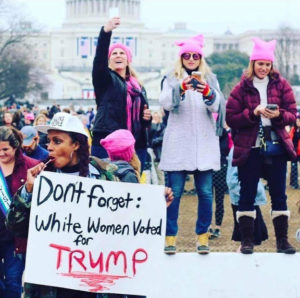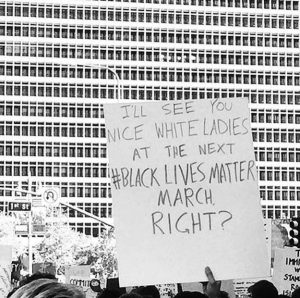Black women are entitled to our anger and frustration
by Zeba Blay
Millions turned out on Saturday for the Women’s March on Washington and its sister marches around the world. I wasn’t one of them.

It isn’t that I was against the core ideals of the march or sided with those who thought it was just a bunch of feminist nonsense. I very much recognized the need for the united front against a new administration whose policies stand to infringe upon the rights of women, people of color, immigrants, the disabled and members of the LGBTQ community. And yet, I still had deeply complex feelings about how I, as a Black immigrant woman, fit into the equation.
Black women tried to save us. Ninety-four percent of Black women voted against Trump. They showed up at the polls and then, after 53 percent of white women voted us into the situation we’re in today, Black women showed up again, in droves and in solidarity. Putting aside the fact that not all of us worshipped Hillary Clinton or resonated with phrases like “nasty woman” and “pussy grabs back,” Black women showed up again.
From an office in NYC, I watched via live-stream as Janet Mock spoke out about the need for taking real action, and Janelle Monae created space for the Mothers of the Movement to chant their slain son’s names, and Angela Davis reminded us that “history cannot be deleted like web pages,” and I felt inspired.
Black women tried to save us. Ninety-four percent of Black women voted against Trump. They showed up at the polls and then, after 53 percent of white women voted us into the situation we’re in today, Black women showed up again, in droves and in solidarity.
I felt equally inspired to see white, Latino, Asian, indigenous, Muslim, undocumented, sexual assault survivors, queer, trans and disabled people take the stage to speak out about the importance of intersectionality and diversity. It may have looked like the very worst of SJW Tumblr to those against the march, but to me it looked beautiful. It looked like America.

And yet, at the same time, it didn’t feel good to see the numerous signs that centered feminism around having a vagina, harmfully excluding trans and nonconforming protestors. It didn’t feel good to know that just days before the march, Janet Mock had to call out the organizers for removing a line she’d contributed to the march manifesto about the need for recognizing the rights of sex workers.
It didn’t feel good to see Madonna, a woman who never really apologized for publicly using the n-word, stand on the same stage as my heroes, joking cavalierly about blowing up the White House in a way that few women of color would ever dare to do.
Days before the protest, writer and activist Jamilah Lemieux announced that she’d be skipping the march for reasons that resonated with me on a deep level. For Color Lines, she wrote about being tired of Black and Brown women having to routinely put their own politics aside in the name of unity.
“I’d like to see a million White women march to the grave of Harriet Tubman, Sojourner Truth or Audre Lorde,” Lemieux wrote.
Even though Lemieux opted out of the march, there were many Black women present who participated while also bravely calling out the same issues she wrote about. In one iconic photo that quickly went viral on social media, a Black woman held up a sign reading “Don’t forget: White women voted for TRUMP.”
Born in Ghana, based in NYC, Zeba Blay is culture writer for Voices, The Huffington Post, where this story first appeared. She can be reached at @zblay.





